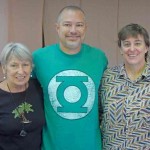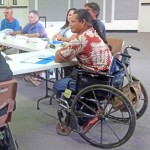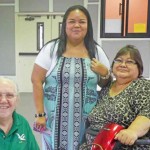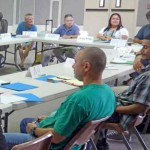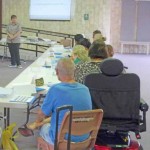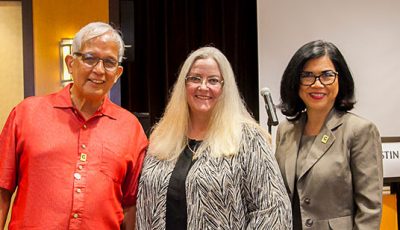Disability network undergoes recovery workshop
- From left, Kaye Christian, chairperson of the Coalition for Anti-Stigma Against Mental Illness; Greg Borja, chairperson of the State Behavioral Health Council /NMPASI projects specialist; and Robyn Priest, PeerLink lead project coordinator for WRAP/peer support training, during WRAP training at the Pedro P. Tenorio Multi-Purpose Center. (Contributed Photo)
- Felix Ulloa, Council on Developmental Disabilities and V.O.I.C.E.S (Rota chapter) member, looks on with other participants at the WRAP training. (Contributed Photo)
- From left, Angie Wheat, V.O.I.C.E.S. (Saipan chapter) member and Center for Living Independently member; Joan Taitano, NMPASI board president/State Behavioral Health Council vice chair; and Lydia Igitol, director of Center for Living Independently. (Contributed Photo)
- WRAP training participants share a common desire to use their experiences to help others with their recovery and wellness. (Contributed Photo)
- Robyn Priest, PeerLink lead project coordinator, facilitates discussion at the WRAP training held at the Pedro P. Tenorio Multi-Purpose Center on Jan, 31, 2017, to Feb. 2, 2017. (Contributed Photo)
The CNMI’s Disability Network Partners, otherwise known as the DNP, in collaboration with PeerLink National Technical Assistance Center, kicked off a two-week long certification training program for Peer Recovery Specialists on Tuesday.
The training is being conducted by Robyn Priest out of PeerLink Technical Assistance Center through a grant from the U.S. DHHS/Substance Abuse and Mental Health Services Administration, in support of SAMHSA’s Strategic Initiative for Recovery Support, which promote peer support and social inclusion of individuals with or in recovery from mental and substance use disorders in the community.
Participants in the training were vetted through an application process, requiring, among other things, that the “individual must be willing to publicly identify as a person living with a mental illness, or substance abuse history in order to model the reality of recovery and wellness.”
“At a very basic level, as I understand it, the idea is that people with ‘lived experience’ are better able to empathize with those who may be new to the recovery process and therefore provide a unique, more relatable level of support,” said NMPASI executive director Jim Rayphand.
The program includes among its values that, “Telling our stories is the beginning of recovery and wellness. While honoring the peer’s perspective at its core, we seek to create an open, accepting place that is collaborative, respectful, and gives hope for the future.”
“Peer support is a system of giving and receiving help founded on key principles of respect, shared responsibility, and mutual agreement of what is helpful. Peer support is not based on psychiatric models and diagnostic criteria. It is about understanding another’s situation emphatically through the shared experience of emotional and psychological pain” (Mead, Hilton & Curtis, 2001).
For more information on the WRAP training and/or Peer Support Worker training, contact any of the DNP partners including, but not limited to the Northern Marianas Protection & Advocacy Systems, inc. at (670) 235-7273/4 or at www.nmpasi.org; or the Council on Developmental Disabilities at (670) 664-7000; University Centers for Excellence in Developmental Disabilities at 234-3690. (PR)



